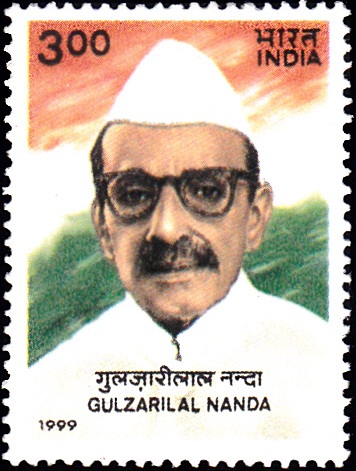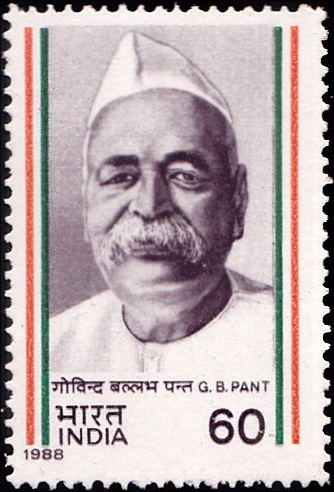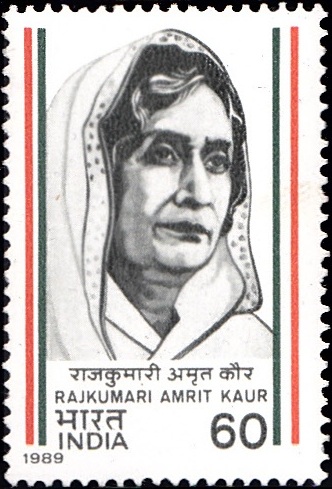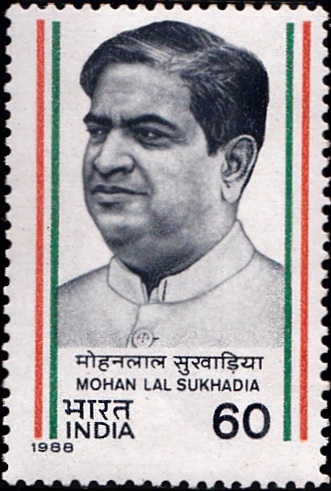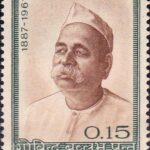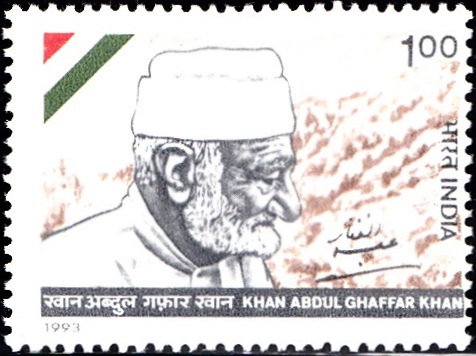
Khan Abdul Ghaffar Khan
A commemorative postage stamp on ‘Fakhr-e-Afghan‘ Khan Abdul Ghaffar Khan (Bacha Khan or Badshah Khan), an Indian independence activist from North-West Frontier Province (NWFP, now in Pakistan) :
Issued on Aug 9, 1993
Issued for : The Department of Posts pays its tribute to Khan Abdul Ghaffar Khan by issuing a postage stamp on this great soldier of Indian freedom.
Design Credits :
Stamp : India Security Press, Nashik. The facsimile of the signature obtained through the courtesy of Nehru Memorial Museum and Library, Teen Murti House, New Delhi.
FDC and Cancellation : Mrs. Alka Sharma, Department of Posts
Type : Stamp, Mint Condition
Colour : Multi Colour
Denomination : 100 Paise
Overall size : 3.91 x 2.90 cms.
Printing size : 3.55 x 2.54 cms.
Perforation : 13 x 13
Paper : Imported un W/M gravure coated gummed Stamp paper in sheets 50.8 x 53.5 cms.
Number of stamps Printed : 0.6 million
Number per issue sheet : 35
Printing Process : Photogravure
Printer : India Security Press
Name : Khān Abdul Ghaffār Khān (Badshah Khan)
Born on Feb 6, 1890 at Utmanzai, Hashtnagar, Frontier Tribal Areas of Punjab Province, British India [now in Charsadda District, Khyber Pakhtunkhwa, Pakistan]
Died on Jan 20, 1988 at Peshawar, Khyber Pakhtunkhwa, Pakistan
About :
- Abdul Ghaffar Khan was a scion of a leading family belonging to the Mohamadzai Pathan tribe of village Uttamanzai in the Charsadda tehsil of Peshawar district, in the erstwhile North West Frontier Province of British India.
- Abdul Ghaffar Khan was born in his village Uttamanzai in 1890. He was a man of great courage and simple habits. He was a devout Muslim and had equal regard for all other religions. “I do not measure the strength of a religion by counting heads”. He had repeatedly said, “for what is faith until it is reflected in one’s life?” “The fundamental principles of all religions are the same, though details differ because each faith takes the colour and flavour of the soil from which it springs”.
- Abdul Ghaffar Khan had his early education at home and was later sent to Aligarh for higher studies. In Aligarh, he was exposed to the daily ‘Zamindar’ edited by Maulana Zaffar Ali Khan and the Urdu weekly ‘Al Hilal’ edited by Maulana Abul Kalam Azad. The seeds of nationalism and politics were sown into the young mind of Abdul Ghaffar Khan.
- His close association with Mahatma Gandhi, Jawaharlal Nehru, Maulana Azad and other top ranking Indian nationalists greatly influenced his political outlook.
- Abdul Ghaffar Khan’s active nationalist career started in 1919 when he plunged into the agitation against the Rowlatt Bills. He took a leading part in the Khilafat agitation which was organised by him in his province.
- His address at a largely attended public meeting on 25th June, 1931 at Bardoli under the Presidentship of Kasturba Gandhi is considered historic. For a long time he served as a member of the Congress Working Committee. Abdul Ghaffar Khan took a leading part in all the Congress movements from 1920 to 1947 and spent about 14 years in jail during that period. During the Indo-British negotiations in 1946-47 he vehemently opposed the partition of India.
- Abdul Ghaffar Khan founded an organisation known as the ‘Khudai Khidmatgars‘ (Servants of God) for carrying on his mission. Its aim in the beginning was social reform but later on it expanded its activities. At Sardaryab, a national centre for the Khudai Khidmatgars was established. The organisation became very popular among the masses.
- He led his people towards freedom and nationalism and for his qualities of leadership was known as ‘Badshah Khan‘. He was also popularly known as ‘Frontier Gandhi‘ due to his close association with Mahatma Gandhi and because of his abiding faith in non-violent resistance. In 1987, a year before his death, Khan Abdul Ghaffar Khan was bestowed the highest honour ‘Bharat Ratna‘ by the Government of India.
- Text Source : Based on Dictionary of National Biography.




